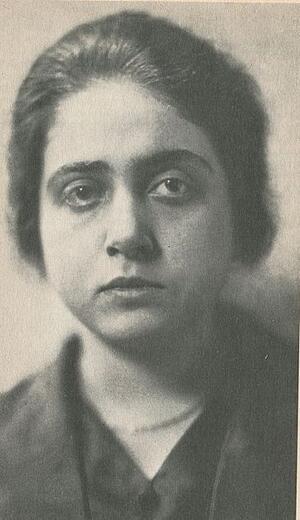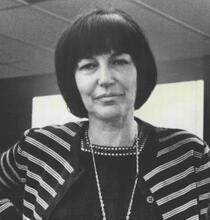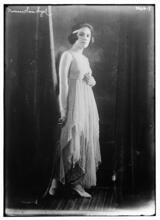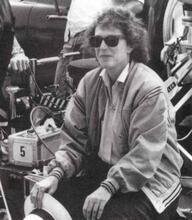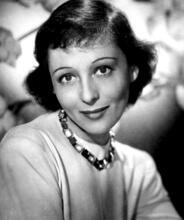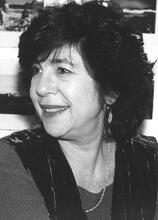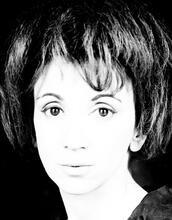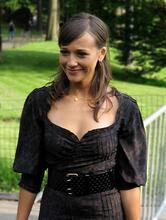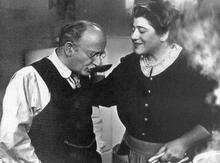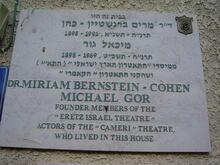Therese Giehse
Actress Therese Giehse in 1919. Image courtesy of Wikimedia Commons.
Focusing on difficult roles written for older women, Therese Giehse earned a reputation as a talented actress who brought Bertolt Brecht’s works to life. Giehse participated in the “Stage Society for primitive and expressionist art: Acting” and spent five years performing in local theaters throughout Germany. In 1925 she joined the acclaimed Munich Spielhaus. In 1933 she co-founded an anti-Nazi literary cabaret called The Peppermill, and after fleeing to Zurich later that year, Giehse toured Europe with The Peppermill performing wildly successful political plays. In 1941 she performed the title role in Brecht’s Mother Courage and Her Children, beginning a long collaboration with the playwright. She returned to Munich in 1954, remaining politically active. She continued acting in films and plays until her death in 1975.
Early Life
Therese Giehse, who was far from possessing contemporary ideals of beauty, pursued her desire to be an actress with diligence and dedication. She was born in Munich to textile merchant Salomon Gift (1849–1911) and Gertrud (née Hainemann, 1862–1934). She adopted the name Giehse after studying acting with Tony Wittels-Stury in Munich from 1918 to 1920 and participating in the “Stage Society for primitive and expressionist art: Acting.” Therese Giehse wandered for five years through Germany’s provincial theaters. She was able to practice acting in Siegen, Gleiwitz (now Gliwice, Poland), Landshut and the theaters of Bavaria, something she always greatly appreciated. In 1924 Paul Barney engaged her, together with Carola Neher and Peter Lorre, at the Staadttheater in Breslau (now Wroclaw, Poland), which served the younger generation of actors as a springboard to Berlin or Munich.
Acting Career
Therese Giehse joined the Munich Spielhaus for the 1925–1926 season. In 1926 Otto Falckenberg opened the Kammerspiele (Chamber Plays) at this theater, which served as a forum for modern and avant-garde drama in the artistically and intellectually very open metropolis of Bavarian culture and which rapidly became Therese Giehse’s cultural home. At his experimental theater, Falckenberg produced works by Carl Sternheim, Heinrich Mann, Georg Kaiser, Franz Werfel, Walter Hasenclever, Ferdinand Bruckner, Alfred Döblin, Friedrich Wolf, Bertolt Brecht and others. Therese Giehse, who even as a young woman had played the “comic old woman” and difficult, unpleasant mother figures, scored a great success as Mother Wolften in Gerhart Hauptmann’s Biberpelz, as Frau John in Rats and as Celia Peacham in Brecht’s Threepenny Opera. That Adolf Hitler honored her as a “racially pure German” and that she was thus protected from antisemitic measures was very painful for her.
Therese Giehse enjoyed a great friendship with Thomas Mann and his children Klaus and Erika. On January 1, 1933, together with Erika and Klaus Mann and Magnus Henning, she founded the literary cabaret Die Pfeffermühle (The Peppermill), where anti-Nazi politics reigned supreme. After the Nazi rise to power, when Giehse emigrated to Switzerland via Austria on March 13 as a Jew and a member of the political Left, the Peppermill was moved to the Hirschen Hotel in Zürich. The shows played to full houses for many weeks. Giehse and Erika Mann toured Europe with the cabaret’s anti-fascist program, scoring a great success. The actors never referred by name to individual cities or entities. Rather, they presented parables, fables and portraits designed to draw attention to the political situation in National-Socialist Germany. Guest performances in the United States were less successful.
In 1936 Giehse married the British author John Hampson-Simpson, thus gaining British citizenship, which could protect her from potential German attacks. From 1938 to 1945 she worked at the Zürich Schauspielhaus, where Oskar Wälterlin enabled many prominent emigrés to resume their work. On April 19, 1941, under the direction of Leopold Lindtberg, she was the first to play Mother Courage in Brecht’s pacifist play and therewith found “her author”—Bertolt Brecht. For his part he referred to her as Europe’s greatest actress. The “Brechtian and Bavarian,” as Benjamin Henrichs termed it, suited her character as an actress to perfection. From 1949 to 1952 she worked at the Berliner Ensemble. Mother Courage (1952), the great female parts in Biberpelz and Gerhardt Hauptmann’s Roten Hahn (1951) and finally Martha Rull in Heinrich von Kleist’s The Broken Jug, established her reputation as an “intellectual popular actress.”
Later Successes and Legacy
Giehse was often accused of being a difficult person and an obstinate actress. Considered stubborn, she delighted in swimming against the stream, was distant, critical, totally unsentimental, lacking in vanity (unlike many of her colleagues), and a highly disciplined actress. After 1945 further major roles included The Madwoman of Chaillot by Jean Giraudoux (1946) and Maxim Gorki’s Wassa Schelesnowa (1947).
From 1949 she was a guest actress at the Munich Kammerspiele, which from 1947 was directed by Hans Schweikart. Here she was especially brilliant in Dürenmatt roles. The Swiss playwright created his The Physicians (1962) for her: the part of the psychologist Dr. Mathilde von Zahnd was among her greatest performances. In addition to her work on the stage, Therese Giehse also appeared in films (e.g. Leopoldt Lindtberg’s The Lost Chance, 1945), radio and television productions. Form 1954 on, she once again resided in Munich. As she grew older, Giehse enjoyed working with aspiring young artists such as Peter Stein, Martin Sperr and Franz Xavier Kroetz, but not with established theater people. During the 1960s, when the extra-parliamentary opposition protest reached even the theaters, she frequently appeared with a new, radical generation of theater creators. At the opening performance at the theater on the banks of the Halle in 1970 she played the title role in Gorki’s The Mother. She bade farewell to her audiences with a highly-regarded Brecht evening at the Berliner Ensemble, with which she toured Germany in 1974, and an appearance in Louis Malle’s film, Julien. Thereafter she was seldom seen onstage, but in 1968, during the war in Vietnam, she appeared in readings of texts by Brecht and was active in the cause of disarmament.
She died in Munich on March 3, 1975.
Selected Works by Therese Giehse
“Ich hab nichts zum Sagen.” An interview with Monika Spert. Munich, Gütersloh, Vienna: 1978.
Drews, Wolfgang. Die Schauspielerin Therese Giehse. Velber: 1965.
Mittenzwei, Werner. Das Züricher Schauspielhaus 1933–1945 oder Die letzte Chance. Berlin: 1979.
Petzet, Wolfgang. Die Münchner Kammerspiele 1911–1972. Munich: 1973.
Lexikon Jüdische Frauen. Edited by Jutta Dick and Marina Sassenberg.

